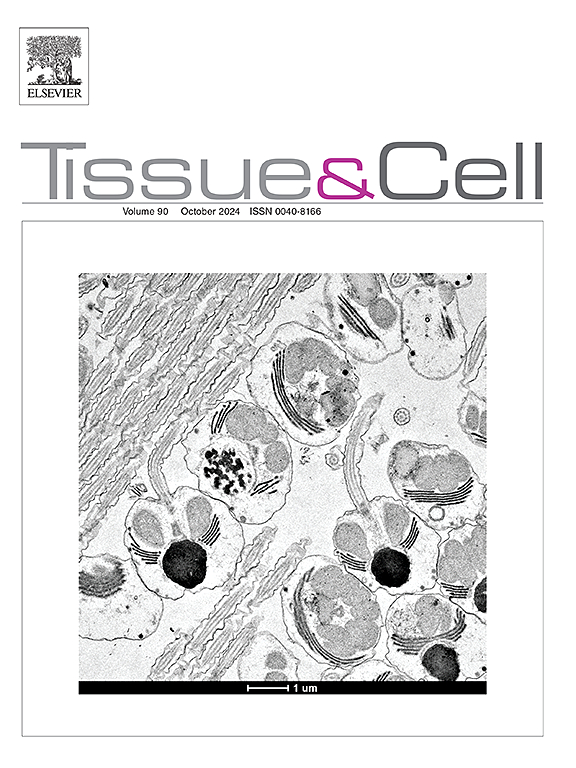The effects of Lycium barbarum polysaccharide on oxidative stress and sperm health in varicocele patients: A randomized clinical trial
IF 2.5
4区 生物学
Q1 ANATOMY & MORPHOLOGY
引用次数: 0
Abstract
Varicocele is an abnormal enlargement of scrotal veins, significantly contributing to male infertility. The plant Lycium barbarum, known for its high antioxidant properties, may enhance fertility quality. This study examines the protective and antioxidant effects of Lycium barbarum polysaccharide on sperm health in patients with varicocele. In a double-blind clinical trial conducted in 2022 at Afzalipoor Hospital in Kerman, 80 patients with varicocele were randomly assigned to either an intervention group (n = 40) or a control group (n = 40). After collecting demographic, blood, and semen samples, the intervention group received 400 mg of Lycium barbarum extract orally for two months, while the control group received a placebo. Blood and semen samples were re-evaluated 90 days post-treatment for markers such as Superoxide dismutase, Glutathione peroxidase, Malondialdehyde, and Testosterone, as well as sperm health parameters. Before treatment, the Mann-Whitney test showed no significant difference between the groups (P < 0.05). The intervention group exhibited effective enhancement in antioxidant enzyme activity (Superoxide dismutase, Glutathione peroxidase). The intervention with Lycium barbarum resulted in a significant decrease in Malondialdehyde (MDA) levels, indicating a reduction in oxidative stress. Significant improvements in Testosterone level and sperm count, motility, and morphology, indicating the intervention's positive impact on male fertility indicators, excluding semen volume (P < 0.05). The volume of semen following the intervention with Lycium barbarum showed a slight increase post-intervention. In conclusion, the results suggest that Lycium barbarum polysaccharide has a positive effect on oxidative stress and sperm health. Further research with larger sample sizes is recommended to enhance the generalizability of these findings.
枸杞多糖对精索静脉曲张患者氧化应激及精子健康的影响:随机临床试验。
精索静脉曲张是阴囊静脉的异常扩张,是男性不育的重要原因。植物枸杞,以其高抗氧化特性而闻名,可以提高生育质量。本研究探讨枸杞多糖对精索静脉曲张患者精子健康的保护和抗氧化作用。2022年在克尔曼的Afzalipoor医院进行的一项双盲临床试验中,80名精索静脉曲张患者被随机分配到干预组(n = 40)或对照组(n = 40)。在收集了人口统计、血液和精液样本后,干预组口服400 mg枸杞提取物两个月,对照组服用安慰剂。治疗后90天重新评估血液和精液样本的标记物,如超氧化物歧化酶、谷胱甘肽过氧化物酶、丙二醛和睾酮,以及精子健康参数。治疗前,两组间Mann-Whitney检验差异无统计学意义(P
本文章由计算机程序翻译,如有差异,请以英文原文为准。
求助全文
约1分钟内获得全文
求助全文
来源期刊

Tissue & cell
医学-解剖学与形态学
CiteScore
3.90
自引率
0.00%
发文量
234
期刊介绍:
Tissue and Cell is devoted to original research on the organization of cells, subcellular and extracellular components at all levels, including the grouping and interrelations of cells in tissues and organs. The journal encourages submission of ultrastructural studies that provide novel insights into structure, function and physiology of cells and tissues, in health and disease. Bioengineering and stem cells studies focused on the description of morphological and/or histological data are also welcomed.
Studies investigating the effect of compounds and/or substances on structure of cells and tissues are generally outside the scope of this journal. For consideration, studies should contain a clear rationale on the use of (a) given substance(s), have a compelling morphological and structural focus and present novel incremental findings from previous literature.
 求助内容:
求助内容: 应助结果提醒方式:
应助结果提醒方式:


